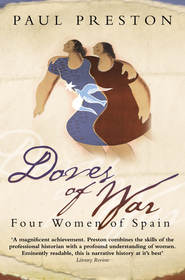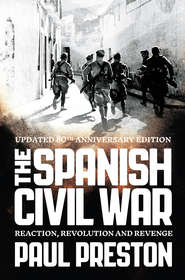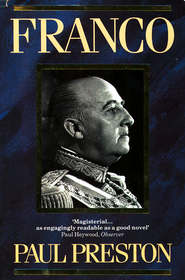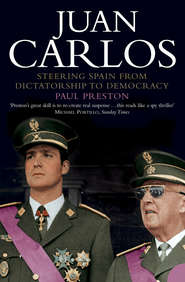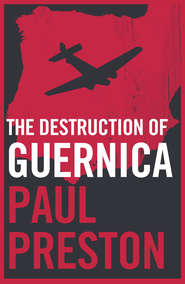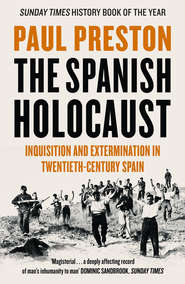По всем вопросам обращайтесь на: info@litportal.ru
(©) 2003-2024.
✖
The Last Stalinist: The Life of Santiago Carrillo
Настройки чтения
Размер шрифта
Высота строк
Поля
After the Ebro, and the end of any reasonable hope of victory, war-weariness overwhelmed the Republican zone. Hunger, privation and the scale of casualties took their toll and much of the frustration was visited on the PCE and the JSU. In October, Carrillo and Pedro Checa were sent to Madrid in an attempt to reverse the process whereby anti-communism was undermining what remained of a war effort. They found not only a generalized fatigue but the determined hostility of the leadership of both the PSOE and the CNT. When the Francoists bombed Madrid with loaves of fresh white bread, JSU militants burned them in the streets. Given the scale of hunger suffered by the Madrileños, this was a less successful gesture than Carrillo later claimed. While in the capital, Santiago heard that his father was actively working with the anti-Negrín elements in the PSOE. They had a monumental row over Wenceslao’s claim that the only solution was to seek an honourable surrender.147 (#litres_trial_promo)
Just before Christmas 1938, Franco launched a final offensive armed with new German equipment. His reserves were sufficient for his troops to be relieved every two days. Carrillo and others were sent to Barcelona in the vain hope that they might be able to organize the kind of popular resistance that had saved Madrid in November 1936. His days were spent commuting to the front trying to keep up morale, but the shattered Republican army of the Ebro could barely fight on. He also worked with militants of the Catalan JSU in an effort to organize popular resistance. Barcelona fell on 26 January 1939. Carrillo claimed later that he was still in the Catalan capital as the Francoists approached and did not leave until they were near the city centre. His own accounts are the only source for his claims that, as he headed north, he was nearly captured by Francoist troops in Girona on 4 February. Shortly afterwards, he crossed the French frontier.148 (#litres_trial_promo) The same is true of his assertion that he was anxious to return to Madrid not only to continue the fight but to be reunited with his wife, Asunción ‘Chon’ Sánchez Tudela, and their one-year-old daughter, Aurora. They had married shortly before the outbreak of the Civil War. He was particularly anxious since Chon had heart problems and Aurora was weak as a result of consistently poor nutrition in the first year of her life.149 (#litres_trial_promo) Why Carrillo did not go back to Madrid and what happened to Chon and Aurora at the end of the war are issues clouded in mystery, as will be explained in the next chapter.
Hundreds of thousands of hungry and terrified refugees from all over Spain left the Catalan capital and began to trek towards France. A huge area of about 30 per cent of Spanish territory still remained to the Republic, but the population was afflicted with ever deepening war-weariness. Although further military resistance was virtually impossible, the Communists were determined to hold on to the bitter end. On the one hand, this was important to their Russian masters as a way of delaying inevitable fascist aggression against the Soviet Union.150 (#litres_trial_promo) It would also allow them to derive political capital out of the ‘desertion’ of their rivals. In fact, they were far from alone in the belief that, given the determination of Franco to carry out a savage repression, it was crucial to resist in the hope of the Western Powers waking up to the fascist threat. However, the Communists were seen as the main advocates of dogged resistance, and they thereby became the target of the popular resentment, frustration and war-weariness. In contrast, the determination of non-Communist elements to make peace on the best possible terms was immensely attractive to the starving populations of most cities in the Republican zone.
In France, Carrillo missed the coup launched on 5 March by Colonel Segismundo Casado, commander of the Republican Army of the Centre. Casado thought that he could put a stop to the increasingly senseless slaughter. Together with Wenceslao Carrillo and Julián Besteiro, and with anarchist leaders, Casado formed an anti-Communist National Defence Junta (Consejo Nacional de Defensa) under the presidency of General Miaja. Casado wrongly believed that this would facilitate negotiation with Franco, with whose representatives he had been in touch. In fact, he sparked off a disastrous civil war within the Republican zone, ensured the deaths of many Communists and undermined the evacuation plans for hundreds of thousands of Republicans. In Paris on 7 March, a Party comrade, Luis Cabo Giorla, gave Carrillo two pieces of bad news. He told him about the coup and his father’s role therein and also that his mother had died some weeks before. Carrillo’s reaction, a virulent denunciation of his own father, would be among the most revealing episodes of his life.151 (#litres_trial_promo)
3
A Fully Formed Stalinist: 1939–1950 (#u06689297-dae3-577b-8075-89516482163e)
With the Civil War still raging, Carrillo remained in France along with other members of the politburo. The prominent Communist General Enrique Líster later claimed that his place should have been back in the central zone where the majority of the JSU’s militants were to be found. However, Carrillo did not accompany Líster and some members of the politburo to Spain on the night of 13 February 1939. Interviewed in 1974, he claimed that he had wanted to return to Spain but had been prevented by a series of reasons. The most implausible of these was that the politburo wished to ensure that he would not find himself fighting against his own father. Carrillo had been in France for nearly six weeks when he learned of the coup carried out by Colonel Segismundo Casado on 5 March. Casado’s anti-Communist Junta included Wenceslao Carrillo as Councillor for Public Order, an ironic echo of his son’s role in 1936 – the irony being that it was Wenceslao’s mission to hunt down Communists. Santiago claimed in 1974 that the news of his father’s involvement with Casado had upset him more than did that of the death of his mother which he had received at the same time. News of the coup could hardly explain why Carrillo had not returned to Spain three weeks earlier. Hardly more plausible was his claim that he could not travel because there was no room on any aircraft flying to Alicante. Líster pointed out that the thirty-three-seat aircraft in which he travelled on 13 February had twenty empty seats. The head of the Republican air force, Ignacio Hidalgo de Cisneros, told Burnett Bolloten that the last six aircraft that flew from France to Republican Spain were ‘nearly empty’. The most likely of Carrillo’s three excuses, which did little for his attempts to construct an heroic past, was that he had been unable to travel because he had scabies. Since Manuel Tagüeña believed that Carrillo had just ignored orders to return, scabies may well have been the excuse that he gave to his superiors.1 (#litres_trial_promo)
The PCE’s politburo met on 12 March to discuss the situation. This was followed by further meetings at which lists were drawn up of those cadres chosen to find refuge in the Soviet Union.2 (#litres_trial_promo) Santiago Carrillo’s sentiments as he sat through these meetings may easily be imagined. Having nailed his colours so firmly to the PCE mast, he was at best deeply embarrassed, if not seriously frightened. He must have been extremely concerned that his father’s participation in the Casado Junta might have undone at a stroke all his efforts to rise within the Party hierarchy. He needed to take drastic action to avoid being besmirched in the eyes of the PCE leadership. After all, the recent purges in the Soviet Union had demonstrated that the treachery of a militant’s relative was believed to contaminate the blood of the entire family and so would have dire consequences for the Party member. Carrillo claims in his memoirs that he immediately locked himself in his hotel room and began to write an open letter denouncing his father. This is simply not true. His text is dated 15 May and opens by saying that it is a reply to a letter sent by his father from London. Since his father did not reach London until early April, that letter could not have arrived much before the end of the month. Moreover, there are ample signs in the letter that the two and half months’ delay had permitted lengthy contemplation, if not consultation with others, in the drafting process. Moreover, the fact that Santiago’s reply was very widely publicized suggested that his principal motivation was to prove his Stalinist orthodoxy by the ferocity of the attack on Wenceslao.
The letter was thus directed more to his superiors than to his father. Without the slightest hint of sadness or sorrow, its text was a mixture of understandable outrage about the consequences of the Casado coup and absurdly exaggerated Stalinist rhetoric. Santiago declared that he had decided to break off all relations with his father because of his participation in ‘a counter-revolutionary coup and in the back-stabbing treachery that handed over the heroic Spanish people, bound hand and foot, to Franco, the OVRA [the Italian secret police] and the Gestapo’. He pointed out, rightly, that internationally the Casado coup had tipped the balance of power in favour of Hitler and, within Spain, had opened the way to a brutal repression. In particular, he wrote with indignation of those Communists who had been imprisoned for the convenience of the Francoists.
Much of the rest of the extremely long text was a hymn of praise to those against whom the Casado coup had been directed: ‘my Party and its most beloved leaders; you insulted Pasionaria, the woman all Spaniards consider a symbol of the struggle for freedom, you hunted her like wolves to hand her over to Franco’. He wrote in similar terms of the Casado Junta’s denigration of, and determination to capture and execute, José Díaz, Jesús Hernández, Juan Modesto and Enrique Líster. He then moved on to insult his erstwhile idol, Largo Caballero, and his one-time fellow bolshevizers Luis Araquistáin, Carlos Baraibar and Carlos Hernández Zancajo, whom he now denounced as Trotskyists motivated by ‘hatred of the great fatherland of socialism, the Soviet Union, and the leader of the international working class, the great Stalin, because they are the vanguard and the faithful friend of all the peoples who fight for liberty, because they have consistently helped the Spanish people, and because they have been able with an iron hand to sweep aside your twin brothers, the Trotskyist, Zinovievist and Bukharinite traitors’.
The letter to his father ended with a final effort to convince the leadership of the PCE that he was a loyal element ready to sacrifice his family for the cause: ‘I remind you that every day I feel more proud of my party which has been the example of self-sacrifice and heroism in the struggle against the invaders, the party that in these difficult times of illegality does not lower its flag but continues to fight fascism with determination and courage … Every day I feel prouder of being a soldier in the ranks of the Great Communist International. Every day my love grows for the Soviet Union and the great Stalin.’ He ended with the words, ‘When you ask to be in touch with me, you forget that I am a Communist and you are a man who has betrayed his class and sold out his people. Between a Communist and a traitor there can be no relations of any kind.’3 (#litres_trial_promo)
The letter was published in early June in the mouthpieces of both the Comintern and the KIM, La Correspondance Internationale and Jeunesses du Monde. Nevertheless, not everyone in the PCE believed in its sincerity. Manuel Tagüeña, who at the time was living in clandestinity in the same safe house as Carrillo near Paris, wrote later, ‘Between Carrillo and me there was never much trust and certainly no friendship. I always believed that he would do anything to further his political ambitions. He had just publicly disowned his father Wenceslao for joining Casado’s Junta. No matter how much it was made out to be the gesture of a heroic Spartan warrior, no one doubted that he had done it to show the PCE leadership that he was the complete militant, ready to sacrifice his family for the good of the cause.’4 (#litres_trial_promo)
When Wenceslao read the letter some weeks later, he refused to believe that it had been written by his son. Accordingly, his reply, on 2 July 1939, was directed not to Santiago but to the person he considered its real author, ‘Señor Stalin’. Wenceslao suggested that the letter might have been dictated by Pasionaria and Jesús Hernández, but he believed it to have been inspired by Stalin. He acknowledged just how much ‘this dagger in the heart’ had hurt him. He ended with prophetic words: ‘I, Señor Stalin, had always educated my son in the love of freedom, you have converted him to slavery. Since I still love him, despite such a monstrous letter, I will ensure by my example that he returns to the place that he should never have left.’5 (#litres_trial_promo)
It would be nearly five decades before Santiago Carrillo would return to the Socialist Party and nearly twenty years before he would see his father again. Then, the seriously ill Wenceslao Carrillo was living in Belgium with the support of the metalworkers’ union. Artur Gallí, the union’s secretary general, had brought Wenceslao to the clinic that he had founded in Charleroi and there he spent his last years. Santiago claimed that, after the PCE had developed its strategy of ‘national reconciliation’ in 1956, Pasionaria and others suggested that it would be politically useful if he were to be reconciled with his father. In this version, when they met, his father said, ‘As far as I am concerned, you have always been my son.’ Santiago introduced him to his wife and young sons and Wenceslao spent time with them at their home in Paris. According to an Asturian Socialist, Manuel Villa, when Wenceslao Carrillo died in 1963, Santiago appeared at the funeral. The many exiled Spanish Socialists who filed past the graveside gave their condolences to other members of the family but ostentatiously refused to shake hands with Santiago.6 (#litres_trial_promo) However, all that was still in the future.
In 1939, while in France, Carrillo was not part of the tortuous process whereby, since April, Comintern officials and the PCE leaders exiled in Moscow were engaged in the preparation of reports on the Party’s role in the Republican war effort and on the reasons for defeat. There were various contributory drafts. From the Comintern officials who had been in Spain there were reports by the Bulgarian Stoyán Mínev (Stepanov) and Palmiro Togliatti (Alfredo). From the Spaniards, there were drafts from Jesús Hernández, Vicente Uribe and Antonio Cordón and testimony from many other witnesses to specific episodes. There was considerable disagreement as to whether the Party leadership was correct in assuming that the war had effectively been lost when Barcelona fell. Líster was convinced that greater foresight and resistance could have undermined the effects of the Casado coup.7 (#litres_trial_promo)
The final report was only for the eyes of Stalin, Dimitrov and the very top echelons of the PCE. The debate was not widened to the rank and file, on the plausible grounds that this could only cause scandal and demoralization among the militants at a time when the Party was scattered around the world and still suffering the trauma of defeat. The Russians wanted the Comintern to be cleared of any responsibility and Dolores Ibárruri exonerated, especially as she was being groomed to take over the Party leadership. Carrillo emerged unscathed. On the few occasions that he was mentioned, his work with the JSU was commended.8 (#litres_trial_promo) The way the process was managed ensured PCE loyalty to Moscow but left the Party committed to the unswerving defence of its own behaviour during the Civil War. It is difficult to see what else the exiled PCE leaders could have done in the context of the Soviet purges given their dependence on Russian charity. Nevertheless, the commitment to Stalinism deprived the Party of flexibility and credibility at a time when the unity of the entire anti-Francoist opposition was of the first importance.9 (#litres_trial_promo)
During the summer of 1939, Carrillo was occupied in a vain effort to prevent the expulsion of the JSU from the International Union of Socialist Youth. In July, at the congress in Lille at which the issue was to be decided, his position was definitively undermined when the letter to his father was distributed to all the delegates.10 (#litres_trial_promo) This disappointment was followed by the news of the signing on 23 August of the Molotov–Ribbentrop pact, the Treaty of Non-Aggression between Nazi Germany and the Soviet Union. Such was the adherence of Carrillo to the Stalinist cause that it caused him no distress. His view of the consequences for the Western Powers, which he blamed for the defeat of the Spanish Republic, was: ‘Those bastards have got exactly what they deserved.’11 (#litres_trial_promo)
Carrillo claimed that it was around this time that his wife Chon and their daughter Aurora arrived in Paris. He told María Eugenia Yagüe, with whom he prepared an authorized biography as part of his electoral campaign in 1977, that the Party leadership had not allowed him to risk going to get them out of Madrid. The dual implication was that he was far too valuable and that he put his loyalty to the Party above family considerations. The description that he gave Yagüe of their experiences in the ten months since he had last seen them is contradictory and also differs from that in his memoirs. Nevertheless, both versions recount intense suffering and hardship. He told Yagüe that Chon and Aurora had managed to get across the French border and, thanks to help from French Communists, had avoided internment in a concentration camp. In the same text, he also claimed that they had
Вы ознакомились с фрагментом книги.
Приобретайте полный текст книги у нашего партнера:
Приобретайте полный текст книги у нашего партнера:






